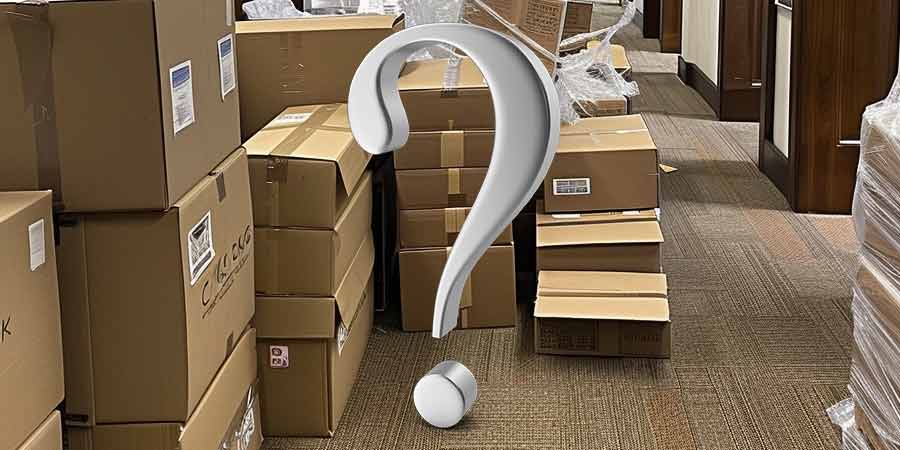Understanding the Importance of Efficient Office Relocation
Moving your office isn’t just about transporting furniture from point A to point B; it’s about keeping your business running without a hitch amid chaos.
Efficient planning and execution can dramatically reduce downtime and help maintain productivity, starting with inventory management.

Key Benefits of Minimizing Downtime During a Move
Why focus on minimizing downtime? Simple: every hour your operations are down, you’re potentially losing business.
Efficient relocation helps maintain employee morale, preserves customer trust, and protects your bottom line.
Pre-Relocation Planning
Creating a Detailed Moving Checklist for Houston Businesses
Start with a detailed checklist. Include every task, from updating your address on marketing materials to securing data backups. The more detailed your list, the less likely you’ll encounter unexpected hurdles.

Selecting the Right Moving Date to Reduce Impact on Operations
Choosing the right day is crucial. For instance, moving over a weekend or during a holiday can reduce the impact on your operations and is a clever strategy often overlooked.
Engaging Employees in the Relocation Process
Get your team involved! Assign roles and responsibilities. It’s a great way to ensure everyone knows their tasks and can help reduce the stress of the move.

Choosing the Right Moving Company
Hire Professional Office Movers Specializing in Business Relocations
Look for professional movers with experience in office relocations. They should be able to handle your specific needs, from moving high-tech equipment to managing large volumes of files.
The Role of Professional Moving Company in Minimizing Downtime
Experienced Houston movers can be a game-changer. They understand the stakes and have the skills to keep your move on schedule.
Technology and Infrastructure Considerations
Ensuring Continuous IT Services During Relocation
Your IT infrastructure is the backbone of your business. Ensure your tech team or IT partner has a clear plan for dismantling, moving, and reinstalling your tech infrastructure without significant service interruptions.
Pre-Move Tech Preparation: A Step-by-Step Guide
This guide should cover everything from data backups to hardware setups at the new location. The goal? No customer should feel that your business missed a beat.

Communication Strategies
Keeping Stakeholders Informed: Clients, Suppliers, and Employees
Communication is key. Keep everyone informed with regular updates about the move’s progress and any changes in how your business will operate in the interim.
Effective Use of Temporary Solutions for Seamless Communication
Consider temporary solutions like forwarding calls to mobile phones or setting up a temporary satellite office. This keeps the communication lines open, no matter where your equipment is.
Logistical Management
Coordinating Logistics to Ensure a Smooth Transition
Coordinate with your local moving company to plan the logistics down to the last detail. This includes access points, elevator reservations, and loading dock access.
Timing Your Move: Strategies to Avoid Peak Business Hours
Plan your move during hours that will impact your business the least. For some, this might mean an overnight move.

Setting Up the New Office
Quick and Efficient Setup Techniques for Immediate Operation
The quicker you set up, the quicker you’re back in business. Focus on key areas that need to be operational first, such as customer service office furniture or critical IT infrastructure.
Prioritizing Essential Departments for Early Setup
Identify which departments are most critical to your business operations and set their office equipment first. This ensures that your Houston business can continue to operate effectively even if other areas are still a work in progress.
Post-Relocation Strategies
Resuming Full Operations: A Timeline for Houston Businesses
Set realistic timelines for when different phases of your new office will be operational. This helps manage expectations internally and externally.
Addressing Post-Move Challenges and Feedback Collection
After the move, solicit feedback from all stakeholders. This can help you manage any issues quickly and improve future relocation processes.

Risk Management
Identifying and Mitigating Risks Associated with Office Moves
Every move comes with risks—from data loss to equipment damage. Identifying these early on will help you mitigate them.
Backup Plans and Contingencies to Keep in Mind
Always have a Plan B. Whether it’s additional insurance for high-value items or having temporary office spaces ready in case of delays, being prepared can save the day.
Case Studies and Success Stories
Lessons Learned from a Successful Office Move in Houston
Success Story 1: A Tech Startup’s Seamless Transition
A small but rapidly growing tech startup faced the daunting task of moving their office to a larger and new workspace to accommodate their expanding team.
With meticulous planning and the right Houston movers, they managed to execute the move over a single weekend.
Key to their success was a phased move plan that prioritized their development and sales teams, allowing them to be fully operational by Monday morning with zero downtime reported.
The company also arranged for temporary workstations at a coworking space as a backup, which helped maintain the momentum.

How Local Businesses Overcame Relocation Challenges
Success Story 2: A Law Firm Maintains Client Services During Move
A well-established law firm in downtown Houston had to relocate to a new building due to lease issues.
Given the sensitive nature of their work, maintaining client confidentiality and service continuity was paramount.
They hired a moving company specializing in secure document transportation and set up encrypted communications to ensure no data breaches occurred.
The move was strategically scheduled in stages; critical client meetings were either rescheduled or moved to virtual platforms.
Their proactive communication strategy kept clients informed and satisfied, demonstrating how transparency can alleviate potential stress in client relationships during significant changes.
Both cases highlight the importance of strategic planning, choosing the right partners, and maintaining clear communication.
These local businesses not only managed to relocate without interrupting their operations but also used the move as an opportunity to refine their processes and improve client trust and employee satisfaction.
Conclusion
Relocating your office in Houston doesn’t have to mean shutting down your business.
With careful planning, the right Houston movers, and effective communication, you can transition to your new space with minimal disruption.
Ready to complete a successful office relocation? Let’s make it a smooth journey, starting with a free moving estimate!

FAQs
What is the best time to schedule an office move in Houston?
Ideally, plan your move during off-peak business hours or over a weekend to minimize disruption to your operations.
How long does it typically take to relocate an office?
The duration depends on the size of your office and the distance of the move, but generally, it can take from one day to several weeks.
What should I look for in a moving company for my Houston office?
Look for companies with specific experience in office relocations, good reviews, and robust insurance options.
How can I ensure my IT infrastructure is properly relocated?
Work closely with your IT team for a detailed plan on moving and setting up equipment at the new location to avoid significant service disruptions.
What are some common mistakes businesses make during an office relocation?
Common mistakes include poor planning, underestimating the complexity of the move, and failing to keep stakeholders informed.


















